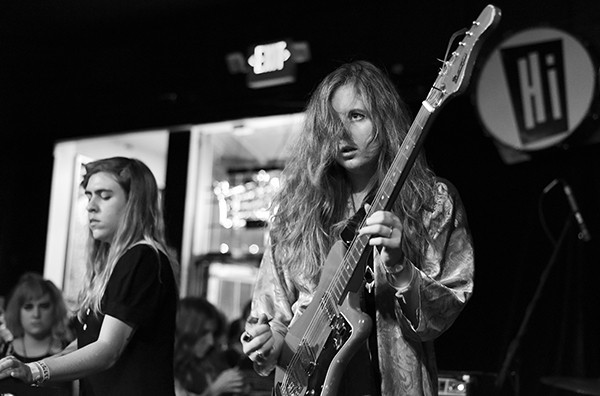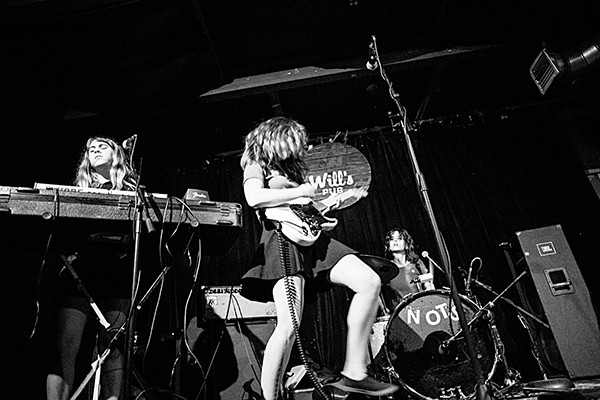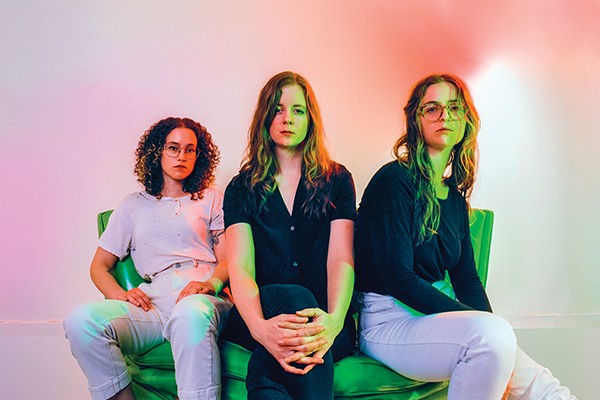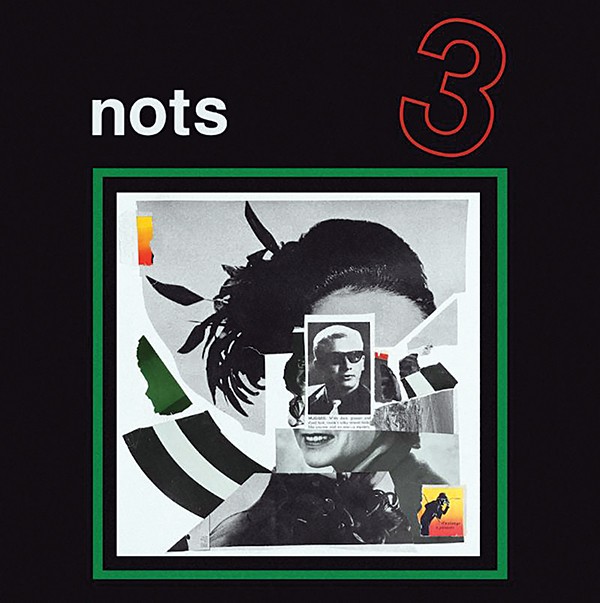Some might believe that NOTS appeared out of the Memphis punk ether, that the ghost of Jay Reatard was granted one good deed to bestow upon mankind. The clouds parted, lightning struck the Goner Records sign on Young Avenue, and NOTS was formed.
While that might make for a good opening movie scene (Craig Brewer, let’s talk.), forming a truly original band in Memphis is usually a slow operation, full of ups and downs, starts and stops, and little support except from the core fan base. Which is the story of NOTS, Memphis’ finest post-punk/garage/no-wave export, featuring Natalie Hoffmann on guitar and vocals, Charlotte Watson on drums, Alexandra Eastburn on synth, and Meredith Lones on bass.
At the time Hoffmann moved to Memphis to attend the Memphis College of Art, the True Sons of Thunder, the Barbaras, and Evil Army were the main acts on the dive-bar circuit. The lack of female musicians on that scene in Memphis was more than noticeable. After linking up with Watson, then a Rhodes College student, to form Bake Sale and, later, the earliest incarnation of NOTS, there was a perceptible change in the city’s musical gender-scape.
“Natalie and I were in Bake Sale for about three years. Once we started writing songs, we played a lot of house parties, and we played the old Hi-Tone a couple times,” Watson explains. “When our drummer from Alabama moved, we decided to start writing new material.”
Hoffmann remembers the earliest version of NOTS as becoming a way to change up the microwaved ’60s girl-group vibe that Bake Sale was channeling.
“With Bake Sale, we were really into 1960s music and trying to cover bands like the Shangri-Las, but that kind of got old. Then I realized I couldn’t sing, so we started to try something different. Once I started hollering, it made a natural shift in things,” Hoffmann said.
“When Carly [Greenwell, Bake Sale’s bassist and an original member of NOTS,] moved, that marked a huge change, because she actually understood how to write harmonies. Without having her in the mix, the songs made less sense. It changed with the lineup and started becoming its own more aggressive thing.”
Aggressive is an understatement.
Hoffmann and Watson went from being the most likely girl group out of Memphis to sign with Slumberland to the next punk band in Memphis to carry the torch lit by the likes of Alicja Trout, Alix Brown, and Pistol Whipped. It didn’t take long for Memphis punk guru and Goner Records storefront manager John Hoppe to take notice.
“I don’t remember the first time I saw NOTS, but I remember the first time I was like, wait a minute, there’s something here that’s different than Bake Sale,” Hoppe remembers.
“It was at that old Lucero loft [at 1732 Overton Park] that was hosting shows for a while. That was the early version of NOTS, but still, I was like, ‘This isn’t Bake Sale. There’s a germ that’s different here,’ and it wasn’t like anything that anybody else was doing. You had that dissonant guitar stuff, and it just wasn’t what I was expecting, at all.”
Somewhere around this time, NOTS did what most bands in Memphis do when they have more song ideas than capital: They asked a friend to record them. Enter Alex Gates.
Gates had already cut his teeth in bands like the Boston Chinks, the Barbaras, and the Magic Kids, and being one of the few people in town who knows how to make budget recordings that don’t sound like some Ardent-wannabe product made him the perfect man for the job, even if those early recording sessions were a little, let’s say, eclectic.
“We made a tape with Alex Gates when Carly was still in the band,” Hoffmann said. “Half of it was recorded in a pool house; the other half of it was recorded in my room. It was about a five- or six-song session.”
Watson also remembers the early recording sessions being a little bit wonky.
“I remember recording at [defunct house venue] the Dairy and watching someone play while listening to the music through one headphone because the other one was broken. There was definitely some makeshift shit going on,” Watson said.
With a demo in the can, NOTS quickly became one of the best emerging punk bands in town. The demo did well, and soon it was time to record a single for Goner Records.
Keith Cooper, the easy-going guitarist from East Memphis who’d been jamming for years in bands like Mojo Possum, the Sheiks, and most recently with Jack Oblivian, stepped up. Cooper had been recording songs for his bands at the Burgundy Ballroom (a home studio worthy of its own cover story) and was more than up to the task of wrangling sounds out of a punk band still trying to hit its stride.
Cooper recorded the Dust Red EP that came out on Goner Records in 2013. The band toured, played more shows, went through another lineup change, and was getting ready to record its debut LP. Then a new player entered the game.
 Brandi Rinks
Brandi Rinks
Natalie Hoffmann at the Hi-Tone
The X Factor
Memphis artist Alexandra Eastburn is infinitely cooler than you — and most other people you’ll ever meet. Her artwork is one of a kind, she designs her own clothes, and is a general bad-ass about town. She seems made for the stage. Still, Eastburn was surprised when she was asked to join NOTS.
“I bought a used drum set for $100 when I was about 13. I used to bang on it after school, but I finally just stopped. I mean, how long can you play drums by yourself before you just get bored?” Eastburn said.
“I didn’t really understand why they wanted me, because they were already so good. I’d go to all their shows, and I DJ-ed some of them. They heard some of the records I played, and I think that’s what propelled them to ask me. I was playing all this weird synth stuff.
“It was so funny because Charlotte and I had already talked about my going on tour with the band and selling my drawings. It sounded like a really great idea, so I had that in the back of my mind while I was out of town for about a month and a half in Joshua Tree.
“I came home, and Natalie called me and was like ‘Charlotte and I were talking, and I was just kind of wondering …’ and I interrupted her and said, ‘Yes, I’ll do it!’ because I thought she was going to ask me to go on tour. She said, ‘Okay, cool. Well, do you want to jam on Sunday?’ I was like, ‘Wait, what are we talking about?'”
So, Eastburn found herself performing as a synth player in a fully-formed band. Naturally, there were some growing pains.
“When I first started playing with them, I was playing a Casio, and it just sounded really goofy. It wasn’t the sound I was trying to contribute. It sounded kind of like a pan flute at times,” Eastburn said.
After acquiring a better synth from her employer, Winston Eggleston, it was time to hit the studio for the debut NOTS album, We Are NOTS, with legendary Memphis producer, Doug Easley.
“Doug was a quiet enigma. He was handed a group of people who were pretty much flailing and trying to get their shit together. The album was recorded mostly live, but his influence was awesome. He was incredibly patient, but he had really good ideas on how to make the songs fit,” Hoffmann said.
That debut album was soon being called one of the best punk records of the year. NOTS started touring as much as possible, eventually catching the eye of Heavenly Records at a South by Southwest showcase. Based in the U.K., Heavenly opened the European tour door for NOTS, which helped create a buzz abroad.
 Olivia Zuk
Olivia Zuk
The Train Starts Rollin’
NOTS would spend much of 2014 and 2015 on the road, hitting Europe for the first time, in addition to touring with Goner alumni, Quintron and Miss Pussycat. The band had become a live wrecking ball, and, after releasing the “Virgin Mary” single on Goner, it was time to start thinking about recording their sophomore LP.
The band opted to go back to their old friend, Keith Cooper, to record Cosmetic. Easley had laid the groundwork for the NOTS recording process, and Hoffmann was confident that Cooper could pick up where he left off.
“I record better to tape. That’s how I record everything at home, and that’s something NOTS had always wanted to do. That’s also how Keith records everything,” Hoffmann said. “He [Cooper] can get serious, but he also keeps things conducive to a creative output. You never feel under the gun, even though the album has a deadline.”
After a month in the studio with Cooper, Cosmetic was finished. The band toured Europe once more, playing Fred Perry showcases and getting increasing attention and critical praise. But “real life” was still waiting for them when they returned to Memphis.
Back to Reality
There’s a saying among musicians in Memphis that you can either be a big local band or a touring band that happens to be based here. But whatever adventure you choose to chase, your bills will still be waiting for you after the gig.
While casual music fans might think that institutions such as the Memphis Music Commission can do something for local bands with a national audience, the reality is that there are very few resources for bands in Memphis trying to make a living off their music.
“Hardly anyone in Memphis lives off the music they make,” Hoffmann said. “I have to remind people we work with in New York City that I still work full-time, and there’s just some stuff I don’t have time to get done. Same with the people from Heavenly. Goner knows where we’re coming from.
“People just assume we can tour forever and not make any money. That’s an interesting misconception. People sometimes treat us like we are very two-dimensional. And one more thing — ‘all female’ is not a music genre.
“I want to give people the benefit of the doubt, because historically girls have not been portrayed as electric guitar players. If you look at ads from the 1960s, you’re not going to see women playing the guitar,” Hoffmann said. “So in that aspect, I think it’s cool. But it makes me angry that we won’t get compared to all-male bands, simply because there are no women in them.
“I’m influenced by plenty of women,” Hoffmann continued, “but I draw influence from everything. It’s kind of stressful when you only get compared to other ‘woman bands.’ I’ve had journalists tell me that I’m not a feminist because I didn’t mention all female bands that influence me.”
The Half-Open Door
NOTS has it better than most of their local contemporaries. The band has a booking agent, a publicist, and record labels in America and abroad. National media outlets have called NOTS one of the best punk bands going right now. Their Facebook page boasts nearly 7,000 fans. They call the birthplace of rock-and-roll home. Shouldn’t that count for something? Not really. As bass player Lones puts it, “Music history doesn’t pay the bills.” But it could, and should in NOTS’ case.
“I do think NOTS is a serious band. I think that reflects how Memphis is right now. Memphis can be kind of crummy, and not everything is a joke or funny,” Goner’s Hoppe said. “It’s okay to be serious.”
“There’s less movement in Memphis; things just sit inside themselves and keep referencing themselves,” Watson said. “When a band comes to town here, it’s because someone inside the community makes it happen. Things happen from the inside out in Memphis, and there’s no one helping out from the outside trying to showcase local music.”
So why stay here? Luckily for their local fans, Memphis has Goner Records, the label that’s supported NOTS since they were recording in pool houses with broken headphones.
“We have progressed so much through our chaos, and having a label that’s so close has been a huge advantage for us,” Hoffmann said. “Everything we’ve asked for from Goner they’ve given us. I think having to talk to someone from across the country would honestly impede our work.
“There was a major label that was asking about working with us, but it just didn’t feel right,” Hoffmann said. “It all comes down to content with me, and I want to be on a label that’s putting out music I like. If there was a major label putting out awesome bands, I might consider it, but they wouldn’t be right down the street.”



 Brandi Rinks
Brandi Rinks  Olivia Zuk
Olivia Zuk